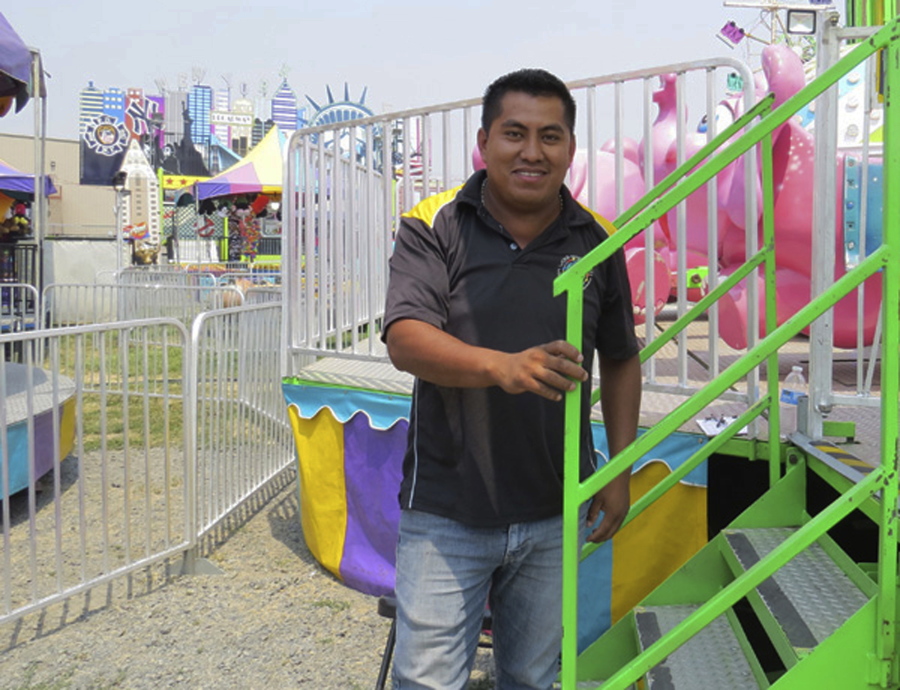KLAMATH FALLS, Ore. — As quickly as it came, it left. Within just four hours, the carnival rides, games and ticket booths at the Klamath County Fair were folded up and packed away as the crew prepared to make their next jump to Reno.
The magicians behind the move are the staff and crew of Wold Amusement, and many are migrant workers from the Veracruz region in Mexico here under H-2B visas. The H-2B program allows U.S. employers or U.S. agents who meet specific regulatory requirements to bring foreign nationals to the United States to fill temporary nonagricultural jobs.
Those who are employed by Jason Wold, who owns the carnival games and rides, come from places along the West Coast seeking adventure, a place to belong or betterment for themselves.
“We’re part of the American landscape,” said Wold.
New face of carnies
Alfonso Uernet was stationed at the super slide directing excited children with his actions rather than his words to take and return the blanket-like cloth which helped their descent on the ride. His job was to relieve workers for breaks, each 30 minutes at a time, and rotate throughout the carnival area.
As is the case with most of the H-2B workers, Uernet speaks little English and he along with everyone who is a part of the carnival leave their homes for months at a time. What is the driving force behind this work? The answer for many is their families.
Uernet has two children, ages 13 and 7, and a wife in Mexico all whom he talks with daily on the phone. He explained that the work is the most practical in terms of the economy and money. Economically, the United States economy is larger than Mexico.
Workers are on a prevailing wage in Mexico which is averaged throughout the year. Prevailing wage is a government set standard based on the hourly wage paid in the largest city in each county. This is averaged for the whole year, so workers make at or above the national statutory minimum wage.
“De aqui, sustento con mi familia estan en Mexico,” he said. “Muy importante mi familia.” Which means “From here I can sustain my family in Mexico … My family is very important.”
Before coming on board at the carnival, Uernet actually knew two people, but has become close with everyone in the past months. The crew travels and sleeps in trailers — if they do not have their own, there are bunkhouse trailers which are shared.
“Hecho no son amigos son companeros,” he said. “The crew is more than friends.”
For Tomas Arellanos, this is his first season working with the carnival. “Este lo que pasa que,” said Arellanos, “This is what happens.” As he told his story, he explained that he was told where he would go and was given a ticket to get here. He hopes to be hired on again for the coming season, in fact he prays to be, but explained that it is ultimately up to God.
Jose Luiz is in second season with the Wold Carnival, but he had previously traveled in another for three. He explained that, at first working with the carnival can be difficult, but it becomes easier with time, especially having already been trained in the operation.
Most of the ride operating staff are from the Veracruz region in Mexico working the carnival on H-2B visas for temporary nonagricultural workers. Those on the visa work for 10-month seasons at a time. From February to November they travel to cities, setting up, running and then taking down the rides before returning to their hometown in November.
Operating the carnival
Jason Wold who owns and runs the business, explained that most everyone is from the Veracruz region due to the recruiter the carnival uses there who helps with the paperwork and hiring process.
In the next year, he is considering bringing on South African workers and integrating them into the course alongside the Mexican workers. He operates in California primarily, and is looking for routes in Oregon in order to spend more time here.



